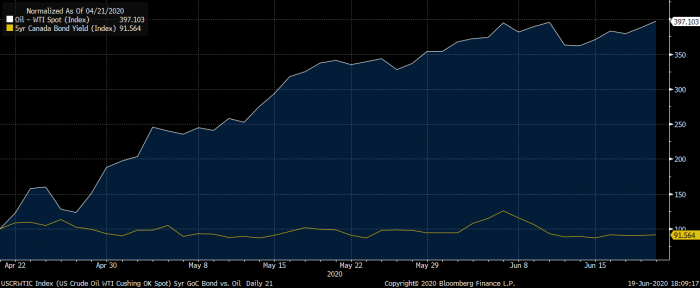
—The Mortgage Report: June 19 —
- Long-term Money on Sale: If you’re willing to commit to a decade-long term, and you live in Ontario, you can now do it for less than at any time in history. 10-year fixed rates are now as low as 2.79% (an effective rate including cash back) for well-qualified borrowers in Ontario. Outside of Ontario, you’re looking at 2.84%. These rates are available on all loan-to-values. Refis too. Just beware: the penalty can be ugly if you break a 10-year before five years. Once you’re five years in, the prepayment charge is just three-months’ interest. These rates will appeal to only a small single-digit percentage of risk-averse borrowers, however. With 5-year fixed rates selling for half a point less, few will make the bet that:
a) inflation and interest rates surge by 2025
b) 10-year fixed rates are worth the extra $2,347 (per $100,000 of loan balance) interest premium in the first five years.
- Renewal Gambit: Your lender may very well call your bluff when you’re trying to negotiate your renewal rate. If you’re well-qualified, let it. More on that from Rates.ca.
- Steady as She Goes: Bond yields barely budged this week. That means yet another week where fixed rates didn’t increase. In fact, quite the opposite. Fixed mortgages are still slowly getting cheaper as lenders eat into their profit margins. Those margins inflated to supersized-proportions after the brief March funding panic died down. Hence, there’s still a little more room for rate discounting, even if bond yields do nothing all summer (which they won’t).
- Pessimist, Alarmist or Realist?: Canada’s housing agency CEO clearly isn’t paid to be a housing cheerleader. In a tweet this week, he suggested people not get excited by the rebound in home sales.
House prices lag economic events. Current price resilience proves nothing: don’t take comfort from low-volume price action. Multiple offers are consistent with a huge decline in new listings. Government support programs have deferred (& reduced) an inevitable economic adjustment.
— Evan Siddall (@ewsiddall) June 18, 2020
- Explosion of Listings: The record 69% surge in new real estate listings “could reflect homeowners that have lost their jobs being forced to sell,” says Capital Economics. “Equally, however, it could be that the sudden re-start in economic activity was always likely to result in new listings rebounding ahead of sales.”
- No Slippery Slope: Oil’s been doing a moonshot ever since the April lows. Today, crude reached its highest point ($40.49 a barrel for WTI) since the price war started in March. That matters for rates given how vital oil—a key Canadian export—is to GDP. Yet, bond yields aren’t responding, as the below chart of oil vs. the 5-year yield shows. That’s curious given the positive correlation between the two over the last decade. If the market isn’t taking as many cues from oil, it suggests a surge in oil prices could entail less risk of higher mortgage rates than it used to.


 log in
log in
7 Comments
My personal theory on oil price is that this surge is artificial and not based on reality, a bit like the stock market. Bonds are more grounded and I think at one point reality will strike. Real oil demand doesn’t yet warrant a 100% increase in oil price since April, in my opinion. So I’d say bond yields simply didn’t follow oil price this time around because the current jump is very speculative.
Hi guys. I’m wondering would make a 10 year fixed worthwhile? How high would rates have to go for it to make sense to pay .5% more than a 5 year fixed? Thanks.
IMO a 10-year is a fools errand. Renewal rates in 5-years need only be less than ~4% for you to be ahead going 5+5 instead of a 10er. Add the heinous penalty should you need to break in those initial 5-years (even with a “fair penalty” lender) there is absolutely nothing economically appealing about a 10-year mortgage rate.
From a simple math standpoint, if you are worried your renewal rate will be higher than 3.50% in five years, you should take the 10 year. Otherwise don’t.
Re: Steady as She Goes
What do the words in brackets mean with respect to the preceding sentence?
“…Hence, there’s still a little more room for rate discounting, even if bond yields do nothing all summer (which they won’t).”
Hi Pekoman, It just means that bond yields will not remain where they are. By the end of summer in three months, they could be materially higher or lower.
I believe there is a growing realization that oil is dying a slow but certain death as it becomes incrementally less important to the Canadian economy going forward.